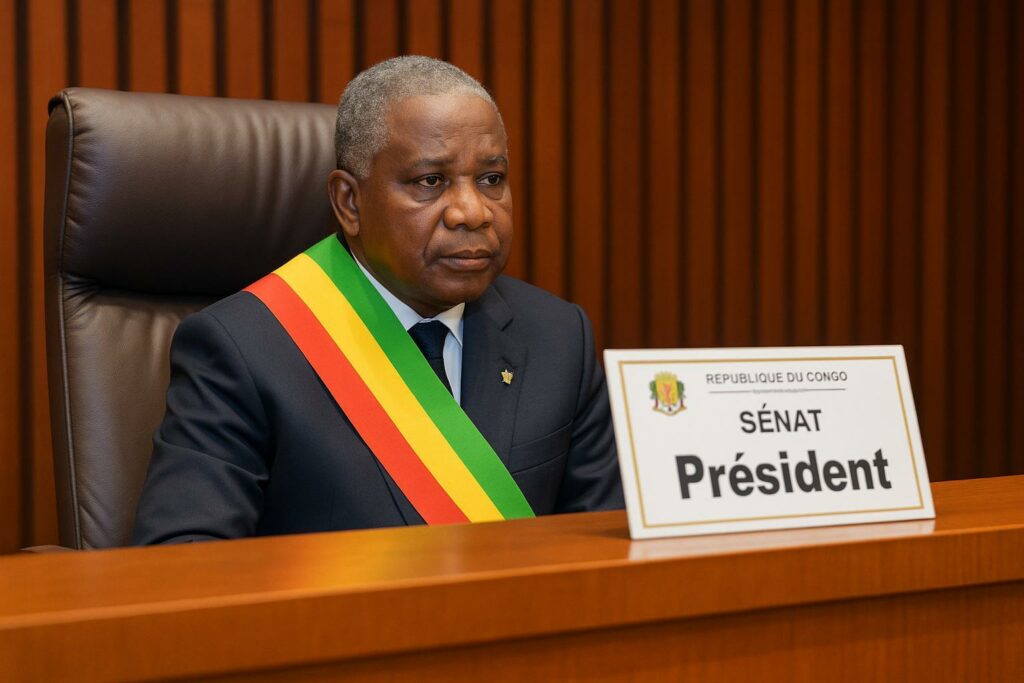Senate session opens with security front and centre
The marbled rotunda of Brazzaville’s Palais du Parlement regained its ceremonial bustle on 15 October 2025 as senators convened for the seventh ordinary budgetary session. The chamber’s president, Pierre Ngolo, used his keynote address to underscore an issue eclipsing routine fiscal debates: the sudden recrudescence of youth-led violence perpetrated by gangs locally dubbed “bébés noirs” and “kulunas”.
Ngolo commended the executive for the ongoing operations designed to reassure citizens, yet cautioned that enforcement will remain fragile “unless anchored in the scrupulous observance of the Republic’s laws and regulations.” The remark set the tone for a sitting that seeks not only to examine the 2026 finance bill but also to interrogate how public resources can buttress peace that, in the speaker’s words, “constitutes the enduring credo of President Denis Sassou Nguesso.”
From civil war trauma to present-day street fear
Members of the Senate drew an explicit historical line between the current climate and the country’s recovery from the 1997 conflict. In Ngolo’s evocation, Congo-Brazzaville shocked onlookers a quarter-century ago by restoring nationwide security without external troops. That success, he argued, forged an inter-generational attachment to stability that must not be compromised by the surge of juvenile banditry.
The grey reality confronting many urban districts is nonetheless stark. Small groups of adolescents—often barely out of primary school—brandish machetes, organize collective extortion and occasionally resort to lethal force. Their notoriety is distilled in the ominous monikers that tabloids have popularised. Senators from both banks of the Congo River traded anecdotes of marketplaces closing early and commuters altering routes, signalling a fraying social fabric rather than isolated crime statistics.
Government strategy: consolidate peace through legality
While no senator questioned the legitimacy of robust police intervention, the chamber’s leadership insisted that the guiding compass must remain the Constitution and the penal code. “Nothing should be carried out outside the law,” Ngolo reiterated, implicitly distancing the Republic from any temptation of summary justice.
The Ministry of the Interior has recently intensified patrols, deployed rapid-response units and revitalised neighbourhood vigilance committees. Yet parliamentarians contend that these measures will prove ephemeral if the judiciary and local administrations are not concomitantly equipped to process offenders, mediate family disputes and monitor reintegration programmes. The forthcoming budget therefore earmarks increased allocations for magistrate training, probation services and community policing logistics.
Socio-economic roots invite multidimensional remedies
Beyond enforcement, several speakers mapped the phenomenon onto unemployment curves, school drop-out rates and the lingering psychological scars of past conflicts. They warned that an exclusively repressive lens risks perpetuating a cycle in which each police sweep is followed by a recrudescence in another district.
Policy advisers present in the gallery pointed to vocational centres, arts collectives and sports leagues that have lowered delinquency in select arrondissements. Senators urged ministries to replicate such initiatives, emphasising the need to mobilise private-sector apprenticeships and the diaspora’s mentoring capacity. The overarching objective, as posited by Ngolo, is to “relink the thread of social authority—from the family to the classroom to the court—so that the Republic’s rigour is perceived not as punishment but as belonging.”
À retenir
The Senate’s budget session has become a de facto forum on public security, framing youth gang violence as a national challenge rather than an urban anecdote. Pierre Ngolo’s address married praise for the executive’s swift deployment to a legalist reminder that durable tranquillity flows from institutions rather than temporary force. The legislative calendar will now test whether fiscal choices match the gravity of the discourse.
Le point juridique et économique
Under Congolese law, the maintenance of public order rests jointly on the executive and the judiciary; article 17 of the Constitution enshrines the inviolability of the human person even during police operations. Budget drafts circulating in the finance committee set aside additional credits for the courts, arguing that expedited yet fair trials deter recidivism and unburden overstretched detention centres.
Economists close to the Commission nationale de planification estimate that every one-percentage-point rise in urban youth employment could cut petty-crime incidence by up to three points, suggesting a fiscal dividend over the medium term. Senators therefore view anti-gang measures not as a cost centre but as an investment in the climate of trust indispensable to domestic and foreign enterprise.

